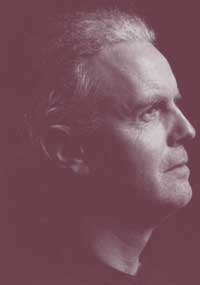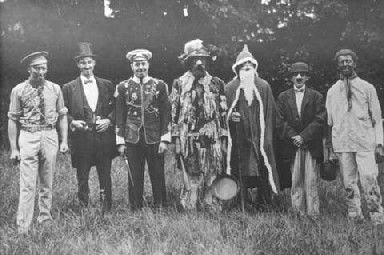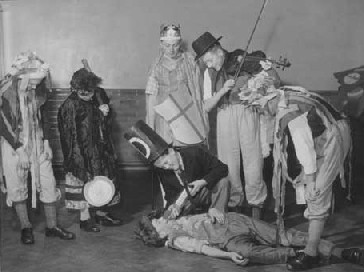
Chris Wood @ FolkWorld:
FW#10, FW#16, FW#18, FW#35
FolkWorld Issue 35 02/2008; Article by Seán Laffey
England in Ribbons
Chris Wood: The Doctor Will See You Now
Where does our native music come from? What was it like in the past? Where is it going? What values does it hold for my life today? Seán Laffey asks questions about folk music that were prompted by the recent work of English singer-songwriter Chris Wood on the Mumming and Guising traditions.
These are some of the most vital questions to be asked by anyone who is interested in folk music.Some would say there's no reason to be skeptical, there's never been a better time to make or enjoy folk music. The web has given us access to information we could only dream about in the 1970s, tunes, songs and their backgrounds are all at our finger tips.

Chris Wood @ FolkWorld: FW#10, FW#16, FW#18, FW#35 |
Since the 1950s folk music has diverged and part of it developed as a distinctly commercial art form, drifting away from the communities and cyclic events that gave it both an impetus and a validation. Largely in the British Isles international success, if success it is, has been achieved within Irish and Scottish music, English music for a number of reasons, summed up in the notion uncool still lags behind, making neither a commercial or populist mark much beyond Blighty and frequently not even gaining its due respect at home.
However, we might ask what sort of music existed before people made folk? What did they play if they had no intention of developing a career out of it? Before it became possible to be a folker what roles did traditional music play in people's lives? You won't find answers to those questions here, but come back another day and we can chew the fat, and in the meantime keep asking them.
Firstly, to put a bit of clarity on this, I'm writing this from an Irish perspective, and the truth is many traditional players here don't often ponder such questions. There are reasons for this, players start young and most have acquired the skill and repertoire long before they begin to pose serious questions about the culture. Secondly unlike the rest of Europe our traditions continued unbroken, today any budding flute player or fiddler has over two hundred years of material from which to build a personal canon, and the good news is that there is more to be published, the well is not yet dry. Irish Folk song is a bit different, yes it exists in books and archives, there are the ballad bands, there are older more authentic recordings, but somehow it isn't the communal activity it once was. Unless of course it is part of a seasonal ritual, but more of that later.
One musician who thinks deeply about those opening questions is Chris Wood. He is a busy man, performing solo, working with story teller Hugh Lupton, touring the country in a series of thematic concept shows, 'Common Ground', and 'The Imagined Village' and throughout December 2007 he was in 'Christmas Champions' taking a fresh look at the Mumming and Guising traditions. He writes music, gives lectures, and is a genuine advocate for the often hidden folk culture of these islands. In particular he is a champion of English folk music. A founder member of the English Acoustic Collective, his work is both rooted in the tradition yet open to new influences as can be seen in one of his current projects with the Guru behind the Afro Celt Sound System Simon Emerson; with whom he has collaborated on the 'Imagined Village' project.
This interview was necessarily stitched together through a series of phone calls and emails, one of the conversations went something like this, I'm in a Café having a cup of tea with Simon Emerson and Billy Bragg, it's a bit too noisy for a chat, can you call me when I eventually get to my hotel?
While Chris enjoys his Barry's moment, let me kick this interview into gear with a CD review. Here's my take on his latest album, 'Trespasser'. I came by this CD in mid-October, and for some strange reason it made me think immediately of a Gothic autumn nearly five hundred years ago, Remember when Martin Luther nailed his 95 objections to a German Church door. In 1517

|
There's a huge slice of that Protestant heritage in the music of Chris Wood. It is characterised by forensic detail in song narrative and the duty to declare personal revelation, it has those easy to learn hypnotic songs (many are new compositions within the folk idiom, some are hymns), each song is full of message and promise, stark ideas are paramount over florid fancy. In Irish songs place is often the central theme, but Wood picks another angle on the notion of home. In England the Diaspora is internal and dispossessed not just of space but of its culture, the gulags are in the wasteland called neglect. In his world view the English class system has for seven centuries made the natives trespassers in their home place, and now in more so-called egalitarian times the old squiring attitudes persist minus the humanity of noblesse-oblige.
Take a simple tune, the addictive 'Monks Gate', essentially English, modal and deliberate, you may know it as the melody to 'To Be A Pilgrim', but a hundred years before that is was 'Our Captain Cries All A Hands' and variants appear in 'The Blacksmith' and the damning comment on the social/ethnic divide that has the descendants of Norman Warlords conscripting their Saxon vassals in 'Fighting for Strangers.' Woods cleverly adopts this melody to 'The Cottager's Reply' as story about how in the twenty-first century it is the 4x 4 owning nouveaux-riche who are usurping hundreds of years of heritage, how? With a signature on the corner of a cheque. But what does it matter? They say. The English poor are mobile and they've been off the land for two-hundred years. Wood's view is that tradition becomes gossamer thin when you have only a short tenure on place.
Themes of cultural fraction and disenfranchise appear over an over in his work.
Sounds glum? Not a bit of it, yes it is dark, yes it uses musical metres we might find hiccoughy. Take time to appreciate the strongly rhythmic guitar playing and the subtle vocal harmonies in the back cloth (then ask where would three part folk harmony be without the Anglican Hymnal, or would anonymous English folk song be so robust without the King James Bible?).
This is work that needs to be heard, we could misjudge English folk music as simplistic, terminally nostalgic, achingly bucolic, a soundtrack to a benign comedy, minor tones chiming beneath the whimsy of Dibley, uncouth and Ribald, but it is bigger than that and more important too. There's an
 Participants in a Mummer's play in the 1930s, featuring Scots & Scars, The Doctor, St. George, Bold Slasher, Grandfather Christmas, Johnny Jack and The Turkish Knight. |
In the end there's more to this than another 24 carat album from Wood, it's a history lesson deep in emotional detail, it begs our listening. Its Lutheran roots are more logical and more persuasive than the astringent Calvinism that has for too long coloured our conception of one of the other religious traditions of this island. It's a way forward for English music and a signpost for a shredded social road we would be best advised to avoid. Essential and possibly the finest English album of the year.
Now let's just take one song from the album and ask Chris to comment on it, that song is 'England in Ribbons.' Written by the story teller Hugh Lupton, it recounts the actions in a familiar mid-winter Mummer's play. (We have a version of this in Armagh and our own Wren Boy culture is not too dissimilar. Dublin photographer Brian Shuel did much in the 1960's to capture the spirit of this homemade culture, some of his excellent collection of pictures are on www.collectionspicturelibrary.co.uk).
Chris Wood toured 'Christmas Champions' throughout December 2007, the show was two hours long and built around an English Mumming play. It developed from a BBC Radio Three commission for their Late Junction programme, we had the opportunity to write a seasonal piece, says Chris, and for the time of year there are two major choices of folk inspiration Mumming and the Mari Llwyd traditions of south Wales.
Wood and Lupton decided on the Mumming plays. Chris is openly enthusiastic about the song writing talents of Hugh Lupton, it was my idea, but it's Hugh's words that make the song so important. The song in question is 'England in Ribbons,' which is a complete Mumming play with all the

|
Secondly he says that Lupton's words are key to the deeper meaning within the piece. Hugh Lupton has constructed the song so that at one level it is the recognisable play with all it's characters, action and stock phrases, but there are points where he employs subtle modern idioms, so we get a bigger understanding about what the pay actually means. Chris tells me that key to England in Ribbons is a dual concept of time, he says that Hugh Lupton conceives linear time as the slow tick of a clock, marking days off a calendar, rights of passage, our personal journeys from cradle to grave. Then there is resurrection time, this is cyclic, seasonal, the year turns round, there are times to sow, tend and harvest, these actions are repeated, revisited from generation to generation. The play is an allegory on Death and Resurrection . It pits St George against the Turkish Knight, western Christendom against eastern Islam. St. George and the Turk fight, neither wins, the conflict is without resolution, this has meaning for our own times, the US and militant Islam are locked in a bloody stalemate (the US has its own George too). The only victim is the concerned innocent: in the play Bold Slasher, a youth, sees the folly of conflict, he tries to stop it only to fall victim, as Hugh Lupton puts it in the 'crossfire'.
Drama of course has to resolve itself and in the Mummer's play the resurrection of the fallen everyman is carried out by the Doctor. Wood has a contemporary take on this. The Doctor is the real hero of English culture, take the biggest TV event of the past ten years, Dr Who. He's the same character from the Mummer's play, he knows everything, he has the one power which eludes us (he never dies and this the heavy cross he has to bear). Like Dr Who the Mummer's Doctor joins the action mysteriously, always at a time when something significant is happening, (when else would use need a medic?). His actions are never violent but always clever, his knowledge allows the re-birth of the innocents, he restores cycles to their order, he is the controller of resurrection time. He leaves when the job is done, but we know he'll be back when tragic time and resurrection time are once again in disharmony.
The song and the play show us the tragedy of ourselves the players caught in linear time, riding the burning fuse of life, mirrored against the glass of the characters that live forever in resurrection time, those who will replace us, who will do what we do, until it is their time to let the new generation take the load.
It is powerful stuff and a powerful album, one that will cycle in the folk canon for years to come.
A shorter version of this article appeared in the Irish Music Magazine Vol. 14 No. 5, January/February 2008.
Photo Credits:
(1) Chris Wood,
(2) Hugh Lupton,
(3)-(4) Mummer's play in the 1930s
(by www.englishacousticcollective.org.uk).
|
To the German FolkWorld |
© The Mollis - Editors of FolkWorld; Published 02/2008
All material published in FolkWorld is © The Author via FolkWorld. Storage for private use is allowed and welcome. Reviews and extracts of up to 200 words may be freely quoted and reproduced, if source and author are acknowledged. For any other reproduction please ask the Editors for permission. Although any external links from FolkWorld are chosen with greatest care, FolkWorld and its editors do not take any responsibility for the content of the linked external websites.
